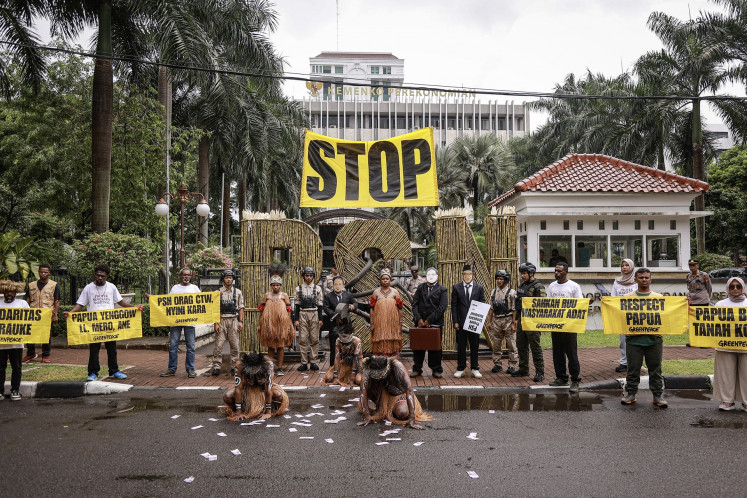Popular Reads
Top Results
Can't find what you're looking for?
View all search resultsPopular Reads
Top Results
Can't find what you're looking for?
View all search resultsWhen will North Korea do something good for the world?
In addition to the South, many countries, including Japan, the US and ASEAN member states, fear the North's nuclear weapons threats because a minor human error in Pyongyang could spell a global disaster.
Change text size
Gift Premium Articles
to Anyone
 Tactical launch: North Korean leader Kim Jong-un monitors a missile launch at an undisclosed location in this undated picture released on Oct. 10, 2022, by North Korea's official Korean Central News Agency (KCNA). Kim said the launches were a response to United States-led joint military exercises in the region. (AFP/KCNA via KNS)
Tactical launch: North Korean leader Kim Jong-un monitors a missile launch at an undisclosed location in this undated picture released on Oct. 10, 2022, by North Korea's official Korean Central News Agency (KCNA). Kim said the launches were a response to United States-led joint military exercises in the region. (AFP/KCNA via KNS)
N
orth Korean supreme leader Kim Jong-un and his sister Kim Yo-jong marked the New Year on Monday by repeating their routine threats to demolish with nuclear weapons South Korea and all other adversaries, especially the United States and Japan, if they do not bow to the siblings' demands. They followed the aggressive actions of their father, Kim Jong-il, and grandfather, Kim Il-sung. However, all three leaders ignored economic developments.
CNBC Indonesia recently ran a story about the bitter experience of young Anthoni Salim, now the owner of the widely diversified Salim Group in the communist state of North Korea. The story is part of the book Liem Sioe Liong's Salim Group, The Business Pillar of Soeharto's Indonesia, a biography of Salim Group written by veteran journalist Richard Borsuk and Nancy Chng. Liem, or Sudono Salim, is Anthoni’s father, who founded the conglomerate.
As a 22-year-old man who had just graduated from a reputable university in the United Kingdom in 1971, Anthoni was very eager to prove his business acumen to his father, one of Soeharto’s closest business cronies.
The young Anthoni imported cement from North Korea and invested a lot in the business. However, he suffered a massive loss because of the low quality of the imported cement, especially its packaging. More than 70 percent of the cement ended up as waste.
"Whereas most cement producers used five-layer sacks, North Korea used only two layers. More than 70 percent of the cement sacks were torn during the unloading process at the port," Anthoni recalled.
His lousy fortune was not only caused by the poor packaging but, more importantly, because at that time Indonesia was reeling in the aftermath of the mass killings of alleged communist sympathizers. In addition, North Korea was known for its bad reputation and was internationally regarded a pariah state.
Anthoni was not alone. Many Indonesian state and private companies shared a similar experience of doing business with North Korea. Most of them swore to never return to the isolated country.
Trade between Indonesia and North Korea has been insignificant for the last five decades. In 2021, Indonesia’s imports from North Korea were valued at only US$410,000, down by nearly 50 percent year-on-year. In 2022, Indonesia's total exports to the North were worth only $35,967.
The world has never heard anything positive from reclusive North Korea, such as the invention of scientific breakthroughs vital to treating uncured diseases like cancer, or technological inventions much needed by people in the developing world, such as cheap water treatment and rice seeds that can multiply production.
Many Indonesians initially admired the North for its courageous resistance against the United States, the world's only superpower until two decades ago. They also adored North Korean leaders. At the same time, South Korea's economy has continued thriving and many Indonesians are among the fans of K-pop and the South’s technological advancements.
While the North remains one of the world's most impoverished nations, the South has transformed from an extremely poor country into the world's 12th largest economy. Samsung, LG, Hyundai and many other large companies have become global household names.
On the other hand, some young Indonesians like Kim Jong-un not because of his success story in developing his nation, but because of his eccentric hairstyles.
Many countries, including Japan, the US and ASEAN member states, fear the North's nuclear weapons threats because a minor human error in Pyongyang could spell a global disaster.
North Korean leaders have been preoccupied with their nuclear ambitions, their only form of deterrence, but left millions of their people living in extreme poverty and facing starvation. They have seemingly forgotten about economic development.
Very few countries are willing to make business deals with the North because, in many cases, if not most, they will be disappointed, as Anthoni experienced more than five decades ago.
Nikkei Asia and the Associated Press reported that in a meeting with senior military commanders on Monday, Kim Jong-un said that the Korean Peninsula was "inching closer to the brink of armed conflict" and that peaceful unification with the South was no longer possible.
North Korea has continued to expand its military and, in recent months, carried out its first successful launch of a spy satellite.
Chairman Kim’s sister, Kim Yo-jong, mocked South Korean President Yoon Suk-yeol's attitude toward confrontation. She also sarcastically "thanked" Yoon for providing the North with a new impetus to build its armaments.
Residents of a South Korean island in the Yellow Sea near North Korea were ordered to evacuate on Friday because of shelling by the North, the South's military said.
The military said the North fired roughly 200 shells near South Korean Yellow Sea islands between 9 a.m. and 11 a.m. local time on Friday. The shells landed on the North Korean side of the maritime border, it added.
The islands have been a recurrent hotspot over the years. In 2002, six South Korean sailors died in a battle with North Korea's navy. In 2010, four South Korean civilians were killed in a shelling attack by the North.
What the world has routinely heard from Pyongyang for decades are reports of terror ranging from lethal and chemical weapons production to the latest development of Pyongyang's nuclear ballistic missiles. The purpose is clear: to force the targeted countries to pay a "ransom", which has sometimes worked, as has been the case with Japan, South Korea and the US.
When will the North change and become a blessing for global civilization? As long as Kim Jong-un and his sister try to cling to their absolute power, they will only focus on the development of deadly weapons such as nuclear arms. But in the end, the only loser of their desired war will be the North itself.
***
The writer is senior editor at The Jakarta Post.










